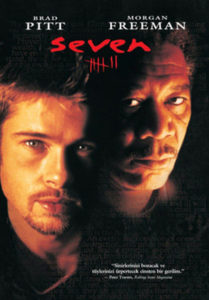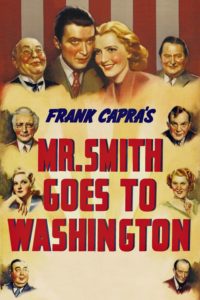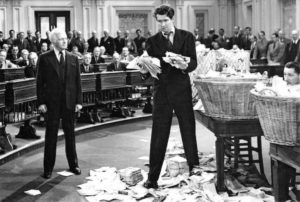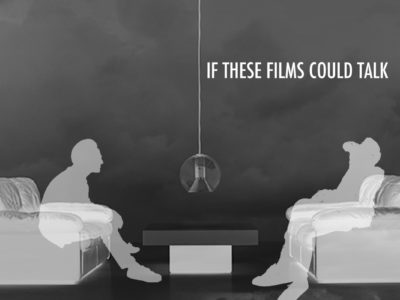The Battle for an Ugly World: Se7en (1995) & Mr. Smith Goes to Washington (1939)
 It’s hard not to be cynical. Don’t believe me? Watch the news. Sit through a few commercials. Scroll Facebook… This can be an ugly little world.
It’s hard not to be cynical. Don’t believe me? Watch the news. Sit through a few commercials. Scroll Facebook… This can be an ugly little world.
Turn on the news and you’re likely to hear stories of violence and tragedy, most of it painfully senseless. Social media is frequently a tactless battleground of name-calling, insulting memes, and exercises in missing each other’s points. But even beyond the broader world, we look around at our own lives and occasionally find the struggles against which we fight are more disheartening and troublesome than we can handle: struggling to repair broken relationships, finding forgiveness for unthinkable betrayals, or making a positive difference amidst a cold and indifferent landscape.
I’ve seen few films in my time that soak in the ugliness of the world more deeply than David Fincher’s 1995 film, Se7en. On the surface, the premise is not dissimilar from most crime procedurals. A serial killer is stalking and executing his victims in a pattern based on the seven deadly sins from the Bible. A detective (Morgan Freeman), only one week from retirement, is forced to investigate the case while also transitioning his replacement (Brad Pitt).
The film could have easily gone for cheap thrills and simplistic moral grandstanding, but, instead, Fincher—with a script by Andrew Kevin Walker—digs deeper into how a person can possibly consider navigating a world so frequently as cruel and ugly as ours. The film is filled with graphic and shocking moments as the victims are revealed (too graphic, actually, for me to detail here), but it is in the quieter and more reflective moments that the film grows truly terrifying. For instance, when Detective Mills (Pitt) and Somerset (Freeman) are sharing a weary beer at the end of a long day and Somerset declares, “I just don’t think I can continue to live in a place that embraces and nurtures apathy as a virtue.” Mills chastises him, “You’re no different. You’re no better.”
 Amidst this dialogue, the film reveals the heart on its sleeve. Somerset replies, “I didn’t say I was different or better. I’m not… I sympathize completely. Apathy is the solution. I mean, it’s easier to lose yourself in drugs than it is to cope with life. It’s easier to steal what you want than it is to earn it. It’s easier to beat a child than it is to raise it… love costs: it takes effort and work.”
Amidst this dialogue, the film reveals the heart on its sleeve. Somerset replies, “I didn’t say I was different or better. I’m not… I sympathize completely. Apathy is the solution. I mean, it’s easier to lose yourself in drugs than it is to cope with life. It’s easier to steal what you want than it is to earn it. It’s easier to beat a child than it is to raise it… love costs: it takes effort and work.”
What truly frightens me about this observation is how frequently I hear exclamations of “I don’t care about any of that” presented as a badge of superiority and—occasionally—even wisdom. We have steadily cultivated the ability to dismiss social movements as bloated hype, or to abandon civil discourse in favor of increasingly polarizing sound bites, or to treat threats to our integrity as less vital than passing legislation…
Well, shoot. Now I’ve gone and made things political. And I would apologize for that, except there are fewer gardens more fertile for this overgrowth of apathy and corruption than the ever-volatile sea of American politics. Which is why Frank Capra’s classic from 1939, Mr. Smith Goes to Washington is a profound dialogical partner for Se7en.
If you have never seen Mr. Smith Goes to Washington because it’s old or because it sounds somewhat educational and, therefore, boring, please discard those preconceptions immediately and seek it out. The film retains a provocative power that is alarmingly relevant nearly 80 years later. The story revolves around a young, naïve Jefferson Smith (Jimmy Stewart in an Oscar-nominated role) who is appointed to a Senate position following the sudden death of the elected incumbent. Smith is specifically chosen for his boyish naivety, which certain political figureheads (including an old friend of Smith’s father –Senator Paine – played by Claude Rains) see as making him easy to manipulate and coerce.
 Initially, Smith doesn’t fare very well. He unwittingly stumbles into a humbling publicity scandal and, in efforts to recover, proposes a bill to the floor intended to help a national boys’ camp that he doesn’t realize contains some damaging stipulations for land grants that benefit a handful of corrupt, greedy senators (including Paine). Smith is then publicly tossed under the proverbial bus by everyone he initially trusted and is falsely accused of trying to profit from his political position. Devastated, Smith sees only one chance to fight for the right thing: to filibuster—a political technique to basically stall a vote on a bill by non-stop talking—until the window in which to ratify the bill and expel him from the Senate closes.
Initially, Smith doesn’t fare very well. He unwittingly stumbles into a humbling publicity scandal and, in efforts to recover, proposes a bill to the floor intended to help a national boys’ camp that he doesn’t realize contains some damaging stipulations for land grants that benefit a handful of corrupt, greedy senators (including Paine). Smith is then publicly tossed under the proverbial bus by everyone he initially trusted and is falsely accused of trying to profit from his political position. Devastated, Smith sees only one chance to fight for the right thing: to filibuster—a political technique to basically stall a vote on a bill by non-stop talking—until the window in which to ratify the bill and expel him from the Senate closes.
The final act of this film, wherein Smith refuses to yield despite intense opposition, deep exhaustion, and even a calculated attack on his character using the people from his hometown, is a staggering marvel to witness. It is the potential last stand of a man who still believes that, despite the corruption he has witnessed by those inside the system, it is still possible for one man to make a difference.
I’ll bet Somerset would be proud.
 Because although Somerset and Mills are dealing with violence and degradation of a far more physical and overtly disturbing nature, I find the deeply rooted corruption and power abuse against which the young Jefferson Smith has to fight in the political world to be no less disturbing and upsetting. It has me asking myself which of the two evils is more difficult to fight: the overt devastation of self-righteous psychopaths or the hidden cesspool of wolves in Senators’ clothing.
Because although Somerset and Mills are dealing with violence and degradation of a far more physical and overtly disturbing nature, I find the deeply rooted corruption and power abuse against which the young Jefferson Smith has to fight in the political world to be no less disturbing and upsetting. It has me asking myself which of the two evils is more difficult to fight: the overt devastation of self-righteous psychopaths or the hidden cesspool of wolves in Senators’ clothing.
Ugly worlds, both of them. It’s hard not to be cynical. But both films, despite their differing tones and finer points, come to similar conclusions in their final moments.
Se7en ends with Somerset, having witnessed first-hand the utterly devastating unraveling of his young partner’s world, quoting Ernest Hemingway as he says, “The world is a fine place, and worth fighting for.” In a chilling commentary, he observes, “I agree with the second part.”
Upon seeing this heartbreaking mountain of letters, Smith says (in a ragged and raspy voice), “I guess this is just another lost cause Mr. Paine. All you people don’t know about lost causes. Mr. Paine does. He said once they were the only causes worth fighting for and he fought for them once… Because of just one plain simple rule: Love thy neighbor. And in this world today of great hatred a man who knows that rule has a great trust… You all think I’m licked. Well I’m not licked. And I’m gonna stay right here and fight for this lost cause. Even if this room gets filled with lies like these… Somebody will listen to me.”
I have so many encouragements and admonishments I’d love to leave you with, but few seem more appropriate than the simple text of the scriptures which reads, “Let us not become weary in doing good, for at the proper time we will reap a harvest if we do not give up.” (Galatians 6:9 NIV).
 Each and every time we feel as if our efforts are for a lost cause, remember that Jesus came “to seek and to save the lost.” (Luke 19:10 NIV)
Each and every time we feel as if our efforts are for a lost cause, remember that Jesus came “to seek and to save the lost.” (Luke 19:10 NIV)
It can be easy to be cynical because it often can be an ugly world.
But it is worth fighting for.







